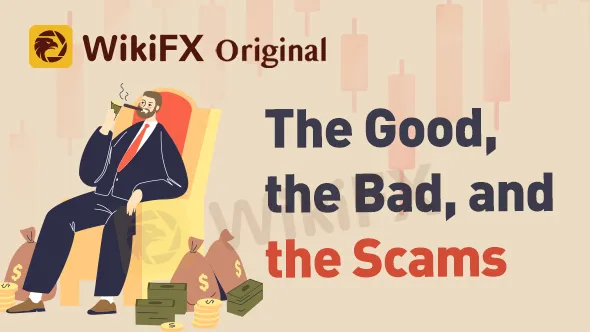简体中文
繁體中文
English
Pусский
日本語
ภาษาไทย
Tiếng Việt
Bahasa Indonesia
Español
हिन्दी
Filippiiniläinen
Français
Deutsch
Português
Türkçe
한국어
العربية
The Good, The Bad, And The Scams
Abstract:In this article, we will discuss regulated forex brokers, regulated but unreliable forex brokers, and unregulated yet scam forex brokers. We will also showcase the features and functions of WikiFX in helping traders choose the right and suitable forex broker.

Forex trading is a lucrative venture for individuals seeking to earn substantial profits in the financial markets. However, with so many forex brokers available in the market, it can be challenging to identify a reliable and trustworthy broker. In this article, we will discuss regulated forex brokers, regulated but unreliable forex brokers, and unregulated yet scam forex brokers. We will also showcase the features and functions of WikiFX in helping traders choose the right and suitable forex broker.
Regulated Forex Brokers
Regulated forex brokers operate under the supervision of regulatory bodies such as the Financial Conduct Authority (FCA), the Australian Securities and Investments Commission (ASIC), and the Cyprus Securities and Exchange Commission (CySEC). These regulatory bodies are responsible for ensuring that forex brokers comply with strict financial and operational requirements, including keeping clients' funds separate from their own. Regulated forex brokers are therefore considered to be reliable and trustworthy.
Regulated but Unreliable Forex Brokers
Some forex brokers may hold regulatory licenses but have poor reputations due to unethical practices such as misappropriation of client funds, poor customer service, and dishonest trading practices. It is essential to conduct thorough research on a broker before investing your money with them. Online reviews, forums, and feedback from existing clients are good sources of information to evaluate a broker's reliability.
Unregulated yet Scam Forex Brokers
Unregulated forex brokers operate without any regulatory oversight, making them more susceptible to fraudulent activities. They may offer unrealistic promises of high profits and employ dishonest trading practices such as stop-loss hunting and slippage to take advantage of their clients. In more severe scenarios, scam forex brokers will also find reasons to block clients‘ withdrawals, requests for unnecessary additional payments, or just disappear into thin air with their clients’ funds. Therefore, it is crucial to avoid unregulated forex brokers as they pose significant risks to your investment capital.

WikiFX is a comprehensive and reliable platform for choosing the right forex broker. With a global database of over 40,000 brokers, WikiFX provides traders with detailed information on brokers' regulatory status, trading platforms, customer service, and trading conditions. The platform evaluates brokers based on factors such as trading platforms, trading conditions, and customer service, which helps traders to compare and choose brokers that meet their trading needs.
One of the critical features of WikiFX is providing information on a broker's regulatory status and whether they are licensed by reputable regulatory bodies. This information helps traders to identify regulated brokers and avoid unregulated brokers that pose significant risks to their investment capital. Additionally, WikiFX allows clients to rate and provide feedback on brokers, giving traders insights into the experiences of other traders with a particular broker.
Another useful feature of WikiFX is the scam alert, which provides warnings on brokers that have been flagged for fraudulent activities. This feature helps traders to avoid scam brokers and protect their investment capital. By using WikiFX, traders can easily identify regulated, reliable, and suitable forex brokers for their trading needs.
In conclusion, choosing a reliable and trustworthy forex broker is critical to the success of your trading career. Regulated forex brokers are considered the most reliable, while unregulated brokers pose significant risks to your investment capital. By using WikiFX, traders can easily identify regulated, reliable, and suitable forex brokers for their trading needs.

Disclaimer:
The views in this article only represent the author's personal views, and do not constitute investment advice on this platform. This platform does not guarantee the accuracy, completeness and timeliness of the information in the article, and will not be liable for any loss caused by the use of or reliance on the information in the article.
Read more

The Hidden Checklist: Five Unconventional Steps to Vet Your Broker
Forex broker scams continue to evolve, employing new tactics to appear credible and mislead unsuspecting traders. Identifying these fraudulent schemes requires vigilance and strategies beyond the usual advice. Here are five effective methods to help traders assess the legitimacy of a forex broker and avoid potential pitfalls.

Doo Financial Obtains Licenses in BVI and Cayman Islands
Doo Financial, a subsidiary of Singapore-based Doo Group, has expanded its regulatory footprint by securing new offshore licenses from the British Virgin Islands Financial Services Commission (BVI FSC) and the Cayman Islands Monetary Authority (CIMA).

CFI’s New Initiative Aims to Promote Transparency in Trading
A new programme has been launched by CFI to address the growing need for transparency and awareness in online trading. Named “Trading Transparency+: Empowering Awareness and Clarity in Trading,” the initiative seeks to combat misinformation and equip individuals with resources to evaluate whether trading aligns with their financial goals and circumstances.

Malaysian-Thai Fraud Syndicate Dismantled, Millions in Losses Reported
The Royal Malaysia Police (PDRM) has received 26 reports concerning the Nicshare and CommonApps investment schemes, both linked to a major fraudulent syndicate led by a Malaysian citizen. The syndicate’s activities came to light following the arrest of its leader by Thai authorities on 16 December.
WikiFX Broker
Latest News
ASIC Sues Binance Australia Derivatives for Misclassifying Retail Clients
Top 10 Trading Indicators Every Forex Trader Should Know
WikiFX Review: Is FxPro Reliable?
Malaysian-Thai Fraud Syndicate Dismantled, Millions in Losses Reported
Trading frauds topped the list of scams in India- Report Reveals
AIMS Broker Review
The Hidden Checklist: Five Unconventional Steps to Vet Your Broker
YAMARKETS' Jingle Bells Christmas Offer!
Revolut Leads UK Neobanks in the Digital Banking Revolution
Fusion Markets: Safe Choice or Scam to Avoid?
Currency Calculator


